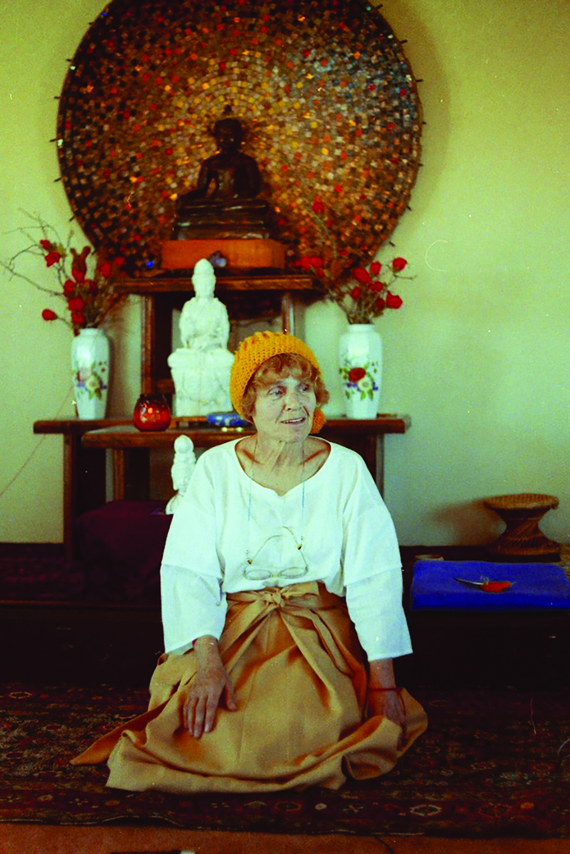In memory of Ruth Denison, one of the first female dharma teachers in the West, who passed away in February 2015 at the age of 92.
Most old students could take you to a place at Dhamma Dena Desert Vipassana Center and describe a day—or days, or weeks—of labor. “I painted that roof, all afternoon one day in the hot sun.” “I dug out the cactus garden behind Ruth Denison’s kuti.” Ruth’s listing for the women’s retreat used to read “All women welcome for work and meditation” (my emphasis).
When Ruth bought a little nearby house from an unfortunate young family (living in the desert requires a strength and resilience that this couple, after many babies and a struggle with alcohol, could not muster), we women were called to follow Ruth down the short stretch of dusty road. Inside the rooms, we stood knee-deep in junk and filth. The young parents had given up trying to maintain cleanliness and order, leaving the bathroom full of dirty diapers, the sink crusted with old food and piled with discarded utensils, the walls stained and splattered.
While we stood uncertainly, holding our pails and rags and scrub brushes, Ruth waded in and began throwing trash from the living room out into the yard while calling encouragement to us: “Come on, dahlings, first we pull out everything, and then we scrub!”
Scrub we did.
It was a long, hot, sticky afternoon in those shadowy rooms. I remember the smell of shit, the grit on my fingers and under my nails, the dust up my nose, the bending, lifting, carrying. Ruth worked among us, her long skirt dragging in the dirt, her sleeves rolled up over her elbows. She directed us, called someone over to give her a hand, inspected every foot of cleared floor or wall or counter, and urged us to more effort.
Ruth’s willingness to engage in every detail of the creation and maintenance of her center was unusual among dharma teachers. “I worked with you like everybody there and then I went into the zendo and was a Vipassana teacher,” Ruth once remarked. “I never was just a teacher and let you only work while I stood there like an administrator. I was always part of everything, and I did not feel it injured my status as a teacher. We grew, actually, together.”
The cleaned-out building was named “Dukkha House” and designated as the women’s dormitory. “Dukkha” (or suffering) seemed the logical name both as an acknowledgement of the former owners’ difficult life and as a reminder to us more fortunate women of the pervasive dissatisfaction that underlies much of our experience.
Ruth’s continual message was be here with what is and care for this environment, and Dhamma Dena provided numerous opportunities for such care and mindfulness. The sinks all emptied into buckets that would fill up and have to be carried out into the desert to pour at the base of a thirsty bush. One had to remember to shut the door, to turn out the light if there was one, to put toilet paper in the container to be burned rather than dropping it down the hole.
Anything left out in the desert sun was soon damaged by the heat and dryness. We learned to take care of faded dishtowels and cloth napkins. And, in the zendo between meditation sessions, Ruth would tell us about the plants and animals that surrounded us here in the Mojave Desert: the plant world so very delicate and vulnerable because of scorching heat and dryness, the spiders and snakes who coiled under trash piles and spun webs in corners, the rabbits who hid and then hopped away to hide again, the coyotes who roamed the vicinity of the property, calling hungrily in the night, the desert tortoise burrowing into the sand, and the many birds who made their nests in cactus plants and up under the eaves of the buildings.
Everything became a teaching, setting us powerfully in a net of relationships, encouraging us to cultivate that deep caring for all of existence that animated Ruth Denison, and offering us opportunities to look at our own mental habits that cause us to suffer.
My resistance to Ruth or to the tasks she set for me, my judgments of her—all this I came to understand as the meat of practice. At first I enshrined my resistance, believed in it, and directed it at Ruth, but gradually I learned to chew it up, really taste and examine it, following it down to that basic dis-ease that rules our lives: wanting things to be other than they are.
What she taught us with mop and scrub brush was exactly what she taught us in the meditation hall: Pay attention to what is going on inside you; develop your awareness until you become sensitive to more and more subtle signals; and journey through your suffering to the ineffable joy that ordinary life offers.
Thank you for subscribing to Tricycle! As a nonprofit, we depend on readers like you to keep Buddhist teachings and practices widely available.
